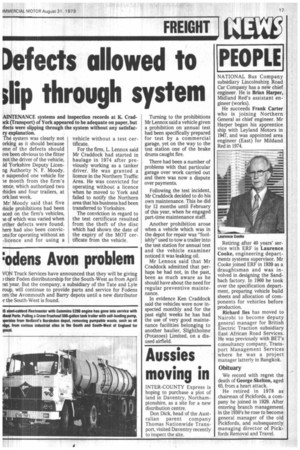lefects allowed to dip through system
Page 19

If you've noticed an error in this article please click here to report it so we can fix it.
AINTENANCE systems and inspection records at K. Crad)ck tTransport) of York appeared to be adequate on paper, but !fects were slipping through the system without any satisfacry explanation. Th4 system was clearly not ork4ng as it should because rme of the defects should we een obvious to the fitter not the driver of the vehicle, Lid orkshire Deputy Licenrig uthority N. F. Moody. e si4spended one vehicle for le month from the firm's ence, which authorized two !hie es and four trailers, at ark last week.
Mr Moody said that five !hie e prohibitions had been ac on the firm's vehicles, le of which was varied when irther defects were found. liere had also been convicails for operating without an -licence and for using a vehicle without a test certificate.
For the firm, L. Lennox said Mr Craddock had started in haulage in 1974 after previously working as a tanker driver. He was granted a licence in the Northern Traffic Area. He was convicted for operating without a licence when he moved to York and failed to notify the Northern area that his business had been transferred to Yorkshire.
The conviction in regard to the test certificate resulted from the theft of the disc which had shown the date of the expiry of the MOT certificate from the vehicle. Turning to the prohibitions Mr Lennox said a vehicle given a prohibition on annual test had been specifically prepared for test by a commercial garage, yet on the way to the test station one of the brake drums caught fire, There had been a number of problems with that particular garage over work carried out and there was now a dispute over payments.
Following the test incident, Mr Craddock decided to do his own maintenance. This he did for 12 months until February of this year, when he engaged part-time maintenance staff.
Another prohibition arose when a vehicle which was in the depot for repair was "foolishly" used to tow a trailer into the test station for annual test and the vehicle examiner noticed it was leaking oil.
Mr Lennox said that Mr Craddock admitted that perhaps he had not, in the past, been as much aware as he should have about the need for regular preventive maintenance.
In evidence Ken Craddock said the vehicles were now inspected monthly and for the past eight weeks he has had the use of very good maintenance facilities belonging to another haulier, Slightholme (Potatoes) Limited, on a disused airfield.




































































































